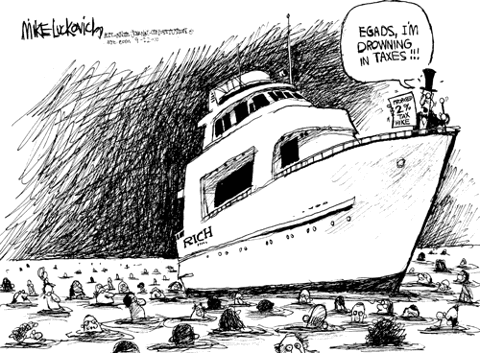

Against Monopoly
defending the right to innovate
Monopoly corrupts. Absolute monopoly corrupts absolutely.
Copyright Notice: We don't think much of copyright, so you can do what you want with the content on this blog. Of course we are hungry for publicity, so we would be pleased if you avoided plagiarism and gave us credit for what we have written. We encourage you not to impose copyright restrictions on your "derivative" works, but we won't try to stop you. For the legally or statist minded, you can consider yourself subject to a Creative Commons Attribution License.
current posts | more recent posts | earlier posts
In honor of election day

[Posted at 11/02/2010 01:05 PM by John Bennett on Against Monopoly  comments(0)]
comments(0)]
With enough government help, I' m really good at this game

[Posted at 10/18/2010 12:38 PM by John Bennett on Monopolistic Competition  comments(0)]
comments(0)]
Copyright protections mostly violate free speech
[Posted at 10/17/2010 12:12 PM by John Bennett on Copyright  comments(0)]
comments(0)]
Well then; All's right with the world

[Posted at 09/27/2010 02:29 PM by John Bennett on Against Monopoly  comments(0)]
comments(0)]
The New York Times discovers open source and likes it
The point of the open general license is that software which finds new uses or builds on the underlying code and alters it then becomes available to the rest of the open source community. Hopefully, the accumulation of applications will in time be a highly competitive rival to the big profit making software suppliers like Microsoft and Apple. It is also a way to reduce the high cost of profit-seeking software makers that retain their software monopolies for long periods.
The article makes a point that financial penalties for failing to abide by the standard open software agreement have been modest if not nil. This no doubt softens the reluctance of users, as evidence by the rapid spread of such applications to new gadgets that are now pouring into the market.
Finally, the article sends readers to the Linux Foundation for more information; to Hewlett-Packard, which has helped develop a standardized inventory list for software so that companies can keep track of their code and licenses," and to a website, "Gpl-violations.org, an organization named after a popular open-source license, [which] receives an e-mail complaint from someone who suspects that a product may use open-source software without adhering to the rules" and checks it out.
[Posted at 09/26/2010 05:39 PM by John Bennett on Open Source  comments(0)]
comments(0)]
Just barely keeping my head above water (and everybody else)

[Posted at 09/26/2010 04:27 PM by John Bennett on Against Monopoly  comments(0)]
comments(0)]
Citigroup uses copyright to censor a critic
DeLong's verdict; "Whatever you think about the DMCA, it should not be used to prune the historical record of primary sources about how various economic policies were perceived at the time." Brad then reprints the Citigroup report link here. Good for him.
[Posted at 09/25/2010 12:17 PM by John Bennett on Copyright  comments(1)]
comments(1)]
Speeding medical progress: better coordination or less IP?
[Posted at 09/24/2010 06:34 PM by John Bennett on Against Monopoly  comments(7)]
comments(7)]
First (free speech) amendment trumps copyright
This provision clearly conflicts with Article 1 Section 8 which gives Congress the power "To promote the Progress of Science and useful Arts, by securing for limited Times to Authors and Inventors the exclusive Right to their respective Writings and Discoveries;...."
I am no lawyer, but since the first amendment was passed on March 4, 1789 after the Constitution was ratified on September 25, 1789, it would logically override that part giving Congress such power (for dates link here). Of course, there is never any certainty about how the Supreme Court may decide an issue.
Mike recommends a book which I haven't read yet, but his statement is pretty strong. He says David Lange and Jefferson Powell, the authors of No Law, "spend the first half making the compelling and detailed (if densely written) case that copyright law absolutely violates the First Amendment." They apparently backslide in the second half.
I do take personal exception to Mike's comments on the State Department officials toadying to the IP interests. As a middle aged and fairly senior diplomat, I had to try to enforce our IP agreements with the Korean government. I had no option to express an opinion, but instead was told to enforce what I was told was the law.
[Posted at 09/16/2010 02:08 PM by John Bennett on Copyright  comments(73)]
comments(73)]
IP as a joke

[Posted at 09/16/2010 07:48 AM by John Bennett on Against Monopoly  comments(0)]
comments(0)]


Most Recent Comments